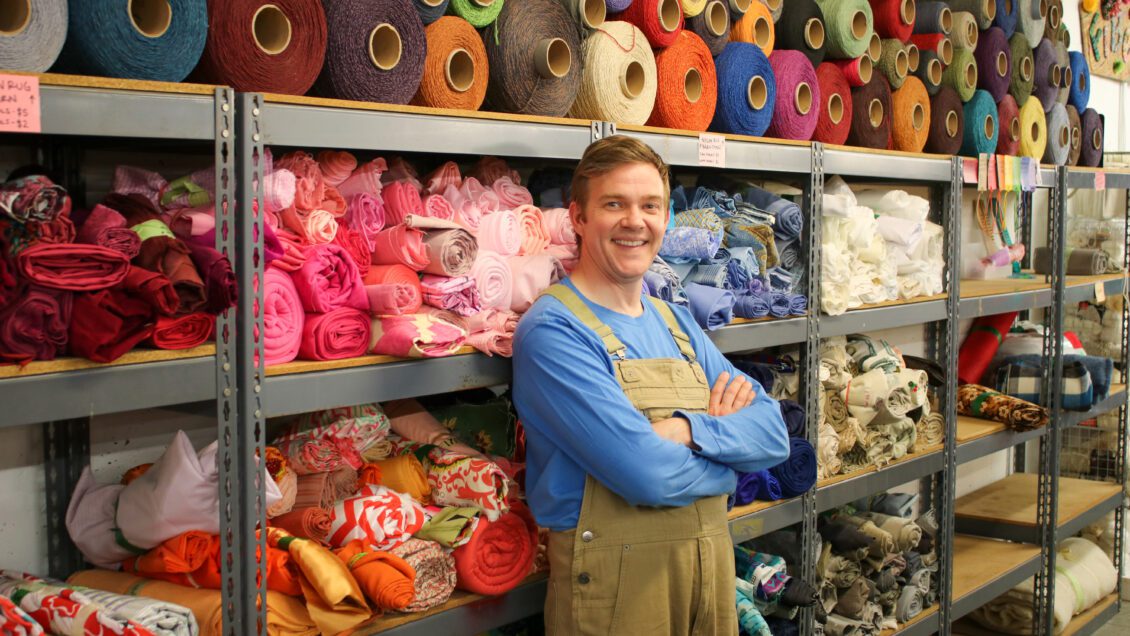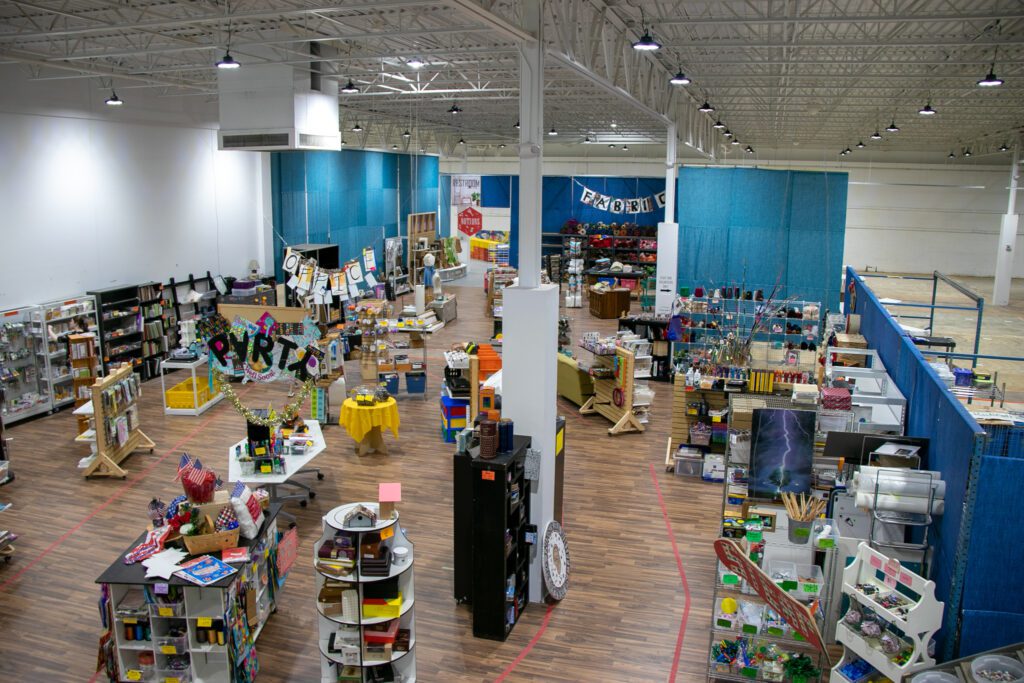
Social entrepreneur Grant Cothran launches ReCraft, South Carolina’s first creative reuse center
Discussions about sustainability often center around harrowing statistics, ways to cut back and consumer blame. Grant Cothran, who earned an MBA in entrepreneurship & innovation from Clemson University, decided to take a more creative and even fun approach to sustainability by founding South Carolina’s first creative reuse center.
“I’ve always been eco-conscious,” said Cothran, who founded ReCraft Creative Reuse Center in Greenville, S.C., shortly after completing the Clemson MBAe program. “However, so many of the action items for sustainability focus on what we shouldn’t do. Creative reuse focuses on what we should do. It’s a joyful expression of sustainability, and I think it’s a pretty fun way for kids and adults to conserve while expressing their creativity through anything they want to make.”
ReCraft is one of about 125 creative reuse centers in the country. The concept is part donation-based store, part craft center and part community maker space with a mission to promote artistic expression, environmental education and community resourcefulness through creative reuse.
“Conservation and sustainability is the backbone of what we do,” explains Cothran. The ReCraft team collects donations from gently used art supplies, leftover fabric, classroom staples and surplus from local manufacturers, retail shops and households. Volunteers then sort the materials, which are sold in the store, used to stock the maker space and distributed to teachers, students and crafters.
In a world of wasteful impulse buys, next-day shipping and “not-so-connected” social media connections, ReCraft provides a tactile space to give old items a new purpose, explore your creative side and gather through community events —sustainably.
“In our maker space alone, we have over 100 different kinds of materials and tools available where kids are invited to craft anything they dream up,” says Cothran. “While we have a donation-based model, we aren’t a thrift store or recycling center. So, to help educate our community on what they can and can’t donate, we created the Periodic Table of Creative Reuse.” Modeled after the Periodic Table of Elements, this guide has over 100 categories of accepted items to help first-time donors — whether businesses or households — share supplies that can take on a new purpose and second life.

“It’s amazing to see people’s reactions when they walk into ReCraft for the first time,” continues Cothran. “Many community members haven’t seen a concept like this, and they say, ‘Why hasn’t anyone done this before?’ Then as soon as people are exposed to this idea of reuse, they can’t see a world without it.”
Cothran came up with the idea to launch the ReCraft Creative Reuse Center while earning his Clemson MBAe. However, it wasn’t what initially drew him to the program. “I was working for a Fortune 500 company and deciding between Clemson and a few other MBA programs,” explains Cothran. “I was drawn to the Clemson MBAe because about half of the cohort was interested in entrepreneurship and starting their own business, while the other half was interested in corporate innovation and improving their current workplace. I initially fell into the latter.”
The Clemson MBAe is designed to bring student ideas to fruition with classes tailored to launch businesses and innovation concepts. Cothran joined the program and was sponsored by his employer through a continuing education program, so long as he centered his studies on an initiative to innovate his workplace. “As I was working on my project, it became apparent that entrepreneurship and innovation go hand in hand,” says Cothran. “We all had an entrepreneurial mindset. However, some of us preferred innovating under the safety net of an existing organization.”
Cothran’s safety net gave way after his first semester. “The company I was working for and basing my innovation project around fell on hard financial times and cut their continuing education program that was paying for my classes,” explains Cothran. “I wanted to continue to invest in myself and my education. However, if I was paying my own way, I wanted to focus on a new project that I personally connected with.” This was when he shifted his sights to what would become ReCraft.
An artist and environmentalist, Cothran spent his weekends and evenings working on creative projects and finding new ways to repurpose old materials. Tasked with finding a new project to center his MBAe studies, he began shifting more time to research. “There was this moment I had my head in a boring book,” explains Cothran, “and my wife Nicole came in and said, ‘Why don’t you focus on something you care about to make this experience fun?’ That changed my approach.”
While traveling for business in Durham, N.C., Cothran decided to use one of his free evenings to browse The Scrap Exchange, a creative reuse center. “As an artist and maker,” says Cothran, “I walked in and just thought, ‘This is it!’”
Cothran pivoted, shifting his MBAe project from his original Fortune 500 company innovation plan to his own entrepreneurial venture — South Carolina’s first creative reuse center. “I was doing academic research on such a new concept that there weren’t studies on it yet,” says Cothran. “Professor Matthew Klein encouraged me to research other reuse centers first-hand, assessing best practices and ways to improve on the idea.” As Cothran traveled for work, he made it his mission to visit every reuse center he could along the way. He covered 18 reuse centers around the country, which would be the start of an invaluable network to lean on in addition to the support of his fellow Clemson cohort members.
“Being in a cohort of like-minded entrepreneurs forces you to take the time to sit down and deep dive into your idea, along with sorting out problems and solutions,” explains Cothran. “You just have to do it, and people are here to support you on the journey.” In addition to late-night brainstorms, Brian Stearns, classmate and founder of RingoFire Digital Marketing in Greenville, S.C., even designed the ReCraft logo on a bar napkin that still represents the nonprofit today. “The second semester in,” adds Stearns, “I announced my idea to start an agency. As a class, we all had these ideas and started working together to support each other through our own skills. We’re still bouncing ideas off each other seven years later. What sets Clemson apart is the connections, support and encouragement built through this program.”
While the reuse center concept made sense to Cothran, the idea still felt novel, and the initial reception with mentors fell flat. “Part of the MBAe program is a capstone business pitch competition called the EnterPrize awards,” explains Cothran. “I lost, and I lost hard.”
Clemson MBAe Professor Matthew Klein remembers competition day. “The initial concern the judging panel had with ReCraft was its reliance on a two-sided market, which can be even more challenging to launch than other business models,” Klein said. “The concept would rely on receiving donations and selling those items to stay afloat. What made the difference was Grant’s ability to reach out to both households and manufacturers for donations, his team, and community support around the idea. More and more new business leaders want to give back to society. Grant found a way to successfully keep waste out of landfills and foster a creative community while generating the revenue needed to make it all happen.”
After graduation, Cothran quit his “perfectly good day job” and founded his 501c3 nonprofit at the start of 2019. “Leaving the security of a corporate 9-to-5 was scary,” says Cothran. “But now I am choosing where I make a difference.” He operated out of a borrowed pickup truck and spread the word about creative reuse at schools, craft fairs and local organizations willing to partner. After a pandemic pause, he opened the first ReCraft brick-and-mortar in a repurposed basement on Haywood Road in February 2022. The shop hit over $100,000 in sales by the end of the year and diverted more than 35,000 pounds of waste from landfills — all while creating a joyful spot for children, artists and makers to gather and craft.
Cothran and the ReCraft team moved to a new 10,000-square-foot location in the Marketplace Shopping Center on Laurens Road, the geographic center of the Greenville metro, on June 10. “When I first moved to Greenville,” says Cothran, “there wasn’t a creative reuse center within 200 miles. Now, we’ve created one in the center of town with even more space for our store, maker space and teacher resource center.”

A 40 percent larger store is only one phase of Cothran’s three-year plan, which includes opening three stores under the ReCraft name and continuing to build a nationwide support network between reuse centers. “An innovator looks at something working well and wants to break it to make it work even better,” says Cothran. “That’s what we’re doing, and we’re sharing our learning with other reuse centers to grow together. I learned at Clemson never to compete when you can cooperate.”
“The store is absolutely amazing,” adds Klein. “Seeing it come together blew me away, and my five-year-old daughter loves going together. This is where she can express her creativity and use her imagination, which is rarely taught now. Also, repurposing these items that could have been trashed just makes you feel good.”
“We’re taking waste and turning it into a candy store of possibilities,” adds Cothran. “Creative reuse brings joy to our community and inspires creativity, but it is just one small part of a larger sustainability solution. We must continue to adapt, and other entrepreneurs will bring the next big idea. I’m grateful for all the support and insight I gained from the Clemson MBAe experience to make my idea a reality. Trust those who support you, and follow the dream.”
Visit the ReCraft Creative Reuse Center website to learn more about the store, events and donation process.
Learn more about Clemson’s MBA in entrepreneurship and innovation.
Get in touch and we will connect you with the author or another expert.
Or email us at news@clemson.edu
